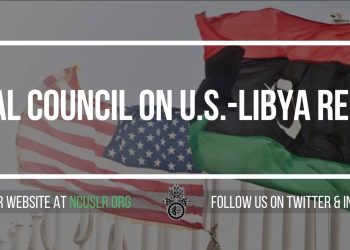Tripoli, March 11: The attempt by Salafists on Friday to attack and destroy one of Libya’s most important Sufi shrines, in . . .[restrict]Zliten, has angered Libyans far beyond the town.
On Friday, over 100 carloads of armed Salafists arrived in Zliten intent on destroying the tomb of one of the most revered Sufis in Libyan history, Sidi Abdul-Salam Al-Asmar al-Fituri. The Salafists — from Benghazi, Tripoli, Misrata, Khoms and other towns and led by Sheikh Salah Al-Kikli from Jebel Nafusa — were then confronted by angry Zliten residents and gun-waving militiamen determined to protect the shrine. These were joined by other militiamen from Misrata.
A group of leading figures and sheikhs from Zliten and the nearby towns of Khoms, M’salata and Misrata, including the last’s newly-elected local council leader, Yousef bin Yousef, then intervened to negotiate with the Salafists. They told them them that the issue of the shrine was a religious one and that they did not have the right to decide what was Islamic. That was the role of Libya’s Grand Mufti, Sadeq Al-Ghariani, they said
However, they proposed that the shrine be temporarily closed pending the Grand Mufti’s decision and also to send a deputation, including representatives of the Salafists, to meet with NTC leader Mustafa Abdul Jalil.
In the circumstances the Salafists decided to agree and left.
The Grand Mufti later issued a decisive fatwa on the matter prohibiting attacks on shrines. He had issued two previous fatwas on the subject, the first of which was seen in some quarters as endorsing the destruction, the second as saying this this was not the time for such action.
There have been several attacks by Salafists on Sufi shrines with graves removed and places ransacked. In January, they destroyed the cemetery of Sidi Ubaid in Benghazi snatching 31 bodies. At Taj near Kufra, they took the body of Sidi al-Mahdi al-Sanussi from his grave. Last month they warned Libyans not to celebrate the birthday of the Prophet — a warning that was massively ignored. The Salafists say they are acting on the advice of one of Saudi Arabia’s leading clerics, Sheikh Mohammad Al-Luhaidan.
Salafists are extremely small in number in Libya and had been regarded with degree of bemusement until they started attacking the shrines. They are also blamed for last month’s attack on the British World War II cemetery in Benghazi. They are also seen as not having initially supported the revolution. “The problem” said one Benghazi businessman, “is that they now have guns”.
Some officials have linked them to efforts by Saadi Qaddafi to destabilize the country. One called them “Saadi Qaddafi’s psudo-Salafi body-snatchers”.
In his TV address from asylum in Niger last month, in which he threatened to return to Libya and lead a counter-revolution, Saadi Qaddafi allied himself with the Salafists. “I not a politician”, he said. “I am a Salafist.” [/restrict]








